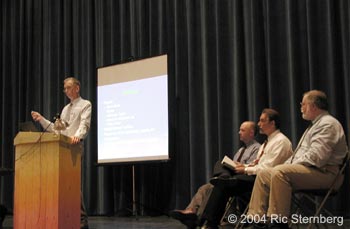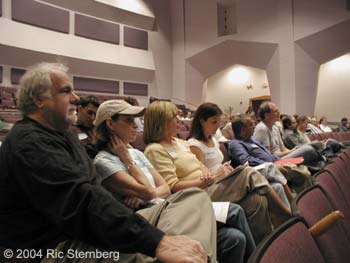
 |
REGIONAL
PLANNING STAKEHOLDER MEETING 1 |
Regional
Planning Process Moves Into High(er) Gear
(probably too late to produce a report in time for the LCRA’s December deadline) |
| The
elegantly appointed (and obviously well-endowed) auditorium seemed especially
cavernous, substantially oversized
for the 60 or so “stakeholders” scattered in small groups throughout
the hall. The Broadway-sized stage apron, backed with a huge arched curtain,
dwarfed the four men who occupied it.
Much-ballyhooed and long-awaited, the development of a regional water quality protection plan for the Barton Springs/Edwards Aquifer contributing zone had finally moved into an accelerated phase. Here was its first public meeting, a Stakeholder Committee organizational meeting, held on June 8, 2004 at the Waldorf School in Oak Hill. This meeting was structured into two parts, first a general assembly, then break-out sessions of small groups representing 8 different “communities of interest”. |
The general session was led by Terry Tull, Executive Director of the Regional Water Quality Planning Project. He gave a brief introduction then passed the baton to the three specialists who have been hired to develop the plan. They outlined the planning process and explained the organization and operation of the stakeholder committee. After this dog and pony show, accompanied by sometimes excruciatingly unreadable Power-Point, they took questions from the assembled stakeholders. Funding for the Regional Plan comes from the Lower Colorado River Authority
(LCRA), which is contributing
$100,000, and the Texas Water Development Board (TWDB), which will kick in $128,000 in matching funds. The TWDB
match is to be against other cash contributions as well as in-kind contributions
of time from volunteers. For this reason, it was strongly urged that
all participants fill out registration forms so that their time at the
meetings can be applied to the match. |
 |
||
| Terry Tull, Executive Director of the Regional Water Quality Planning Project moderates the first Stakeholder Committee meeting. Seated - consultants Grant Jackson, Naismith Engineering, Leonard Olson, Good Company Associates and Tom Brown, Naismith Engineering. | |||
A
tentative time for the second meeting was announced. This was to be
Saturday, June 26th. When requests for a non-Saturday
meeting were made, the moderators asked for a show of hands. This revealed
that most people in the room would prefer a weekday evening to a Saturday
meeting. Happily,
the organizers have heeded the stakeholders’ wishes. The second
stakeholder committee organizational meeting will be on a Wednesday.
Here are the official
announcement and the agenda. In the breakout sessions, members of all groups brainstormed and developed lists of issues that were important to each group. |
||||
 |
||||
| The Hamilton Pool Road contingent, a strong and vocal group among the assembled stakeholders. | ||||
Some groups went as far as to develop goals that they would like to see accomplished. During the next meeting, each group will be expected to solidify its ideas and goals, and to elect 3 delegates and an alternate to the full stakeholder committee. In subsequent meetings, the big committee, made up of 24 delegates from those 8 “communities of interest” will be expected to, by consensus, develop a plan that will satisfy the needs and concerns of all. Whew! More information on the stakeholder process is available on this Q&A page from Terry Tull, the Plan's Executive Director. It’s no wonder that the organizers don’t expect to have a plan completed until February (and that may be very optimistic). Unfortunately, the LCRA has already announced that they will be going ahead with their Hamilton Pool Road pipeline plans after a postponement until December. In other words, even though the LCRA is supposedly giving the plan a chance to be completed by waiting, really they are not waiting long enough. If all were fair, the LCRA would allow sufficient time to explore all its ramifications before rushing into a project with potentially disastrous impact on water quality, not to mention our quality of life. But who ever said the world was fair? |
||||